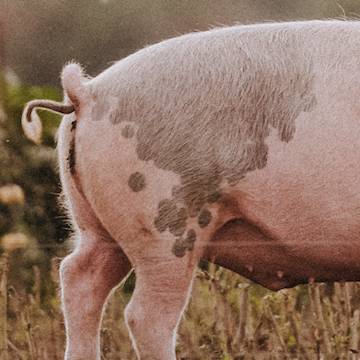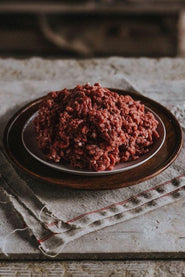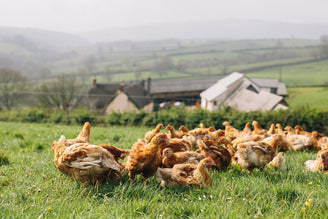Poor diets in this country are pretty much as harmful as smoking - a staggering fact revealed in part one of the National Food Strategy, released today. That’s 90,000 deaths a year. But such is the mess our food system is in that before a full, comprehensive fix can be presented, we need an emergency interim strategy (hence Part One), which tackles the escalation of our food crisis that has surfaced with the arrival of Covid-19 and Brexit.
Pipers Farm began when co-founder Peter Greig looked on in alarm as his father intensified production of chickens in the 1950s. Birds which had been reared with grass under their feet on the family farm in Kent were now in concrete sheds, on an anonymised, industrially produced diet instead of natural grains, grasses and bugs foraged outdoors. On paper it made sense – costs were controlled, growth rates standardised, and the economies of scale made the operation more profitable. But standing looking at those birds Peter felt strongly that that this was the start of a dangerous turn in farming, that this was not food that he wanted to eat, nor wanted to feed his family. So with wife Henri they turned and ploughed their own furrow of farming with animal welfare, native breeds and sustainability at its heart, thanks to grass, this country’s finest crop.

Since that time the industrialisation and intensification of farming has escalated in order to feed a growing population that expects cheap food. The supermarkets created a battle ground of price, driving down what they paid farmers for the food produced in the process. Yet the UK has among the highest animal welfare and environment protection standards in the world, quite rightly limiting where and how costs could be saved, such as a maximum stocking density of chickens in a given area.
As Brexit approaches, trade deal negotiations are accelerating. As these will last 25 years, it’s crucial that our food standards are protected and farmers empowered to protect our soils, wildlife, and environment, not feel forced to cut standards to remain profitable. Trade deals are about compromise – but at times it has felt that the UK Government may give away the farm and allow the import of food produced to highly questionable standards, in favour of more lucrative gains in other trade deal sectors. To counter this, Henry Dimbleby, who has led the Food Strategy consultation, proposes that instead of having a blanket set of standards that would make any trade deal nigh on impossible, that a core set of non-negotiable standards is the way forward. Only time will tell how this will play out, but they are asking for ideas from all parts of society and business.
Everyone deserves to eat well. We believe a robust, nutritious food system that can create jobs, contribute to society and protect the environment, is centred around championing domestic farming over global trade.
That’s not to say that imports should end entirely, as that is probably neither realistic nor economically rational, but the backbone of the food we eat should start with what grows well on our green isles and be given the support to allow it to flourish. As Henry stated, we need “sticks in the ground” to mark where our values will not budge, and agree with his statement: “I do not believe that environmental degradation is a viable solution to food poverty.” Exporting low animal welfare standards and environmental damage by importing food produced under compromised standards is just going to keep our global food system in the same damaging state. There is no question that things need to change. Covid and Brexit is forcing us to rethink. In the rush to move forward and fix, we hope sustainability will sit at the heart of what is to come.





